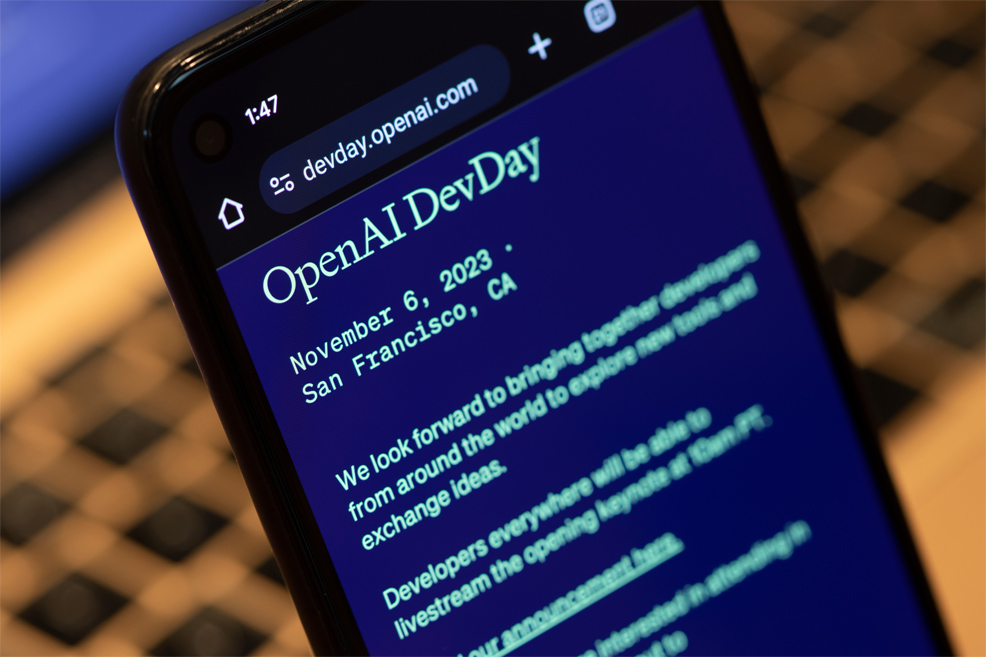
7th November 2023 OpenAI's Sam Altman hints at next-generation AI OpenAI, the company behind ChatGPT and DALL·E 3, held its first developer conference yesterday in San Francisco. In addition to revealing new products and model upgrades, CEO Sam Altman hinted at something much greater that may be arriving soon.
Following the launch of ChatGPT in November 2022, OpenAI released a more powerful version based on GPT-4 in March 2023. This featured many improvements such as a larger text input length, more creative and nuanced responses, and improved safety and security. OpenAI is now expanding its capabilities even further, in a version called GPT-4 Turbo. Now available to all developers as a preview, this will come with a massive 128K context window. In other words, enough to fit the equivalent of more than 300 pages of text in a single prompt, compared to about 50 pages for the standard GPT-4. Other new features will include major enhancements to app development and web coding, with better instruction following, JSON mode, reproducible outputs, parallel function calling, and more. Its training cutoff date is also being moved forward to April 2023, meaning it can work with more current information. Previously, for example, a user might have asked the question: "Who is the current Prime Minister of the UK?" and be told "Boris Johnson". But it will now answer correctly as "Rishi Sunak".
GPT-4 Turbo with vision
In addition to text analysis, a second version – known as GPT-4 Turbo with vision – will understand both text and images in detail. Developers will be able to integrate vision into their apps, products, and services. Use cases might include auto-generating captions, analysing real world images in detail, and reading documents with figures. The input and output tokens for the Turbo edition of GPT-4 are respectively 3× and 2× less expensive than before. At the conference on Monday, OpenAI also confirmed that ChatGPT has 100 million weekly users, including more than 2 million developers building solutions through its API. A new "custom" ChatGPT, known simply as GPTs, is also being launched. As shown in the video below, this will enable anyone to create a tailored AI bot to be more helpful in their daily life, at specific tasks, at work, or at home – and then share that creation with others. No code required. "Starting today, you can create GPTs and share them publicly," said OpenAI in a blog post. "Later this month, we're launching the GPT Store, featuring creations by verified builders. Once in the store, GPTs become searchable and may climb the leaderboards. We will also spotlight the most useful and delightful GPTs we come across in categories like productivity, education, and 'just for fun'. In the coming months, you'll also be able to earn money based on how many people are using your GPT."
Alongside all this, the company is releasing "Assistants API", to help developers build agent-like experiences within their own applications. A new text-to-speech API called Audio API is also being released, featuring six preset voices: Alloy, Echo, Fable, Onyx, Nova, and Shimer. From the brief samples released, these are likely to match ElevenLabs in terms of quality and realism. The API will provide access to two generative AI models, priced at $0.015 per 1,000 input characters. DALL·E 3, the latest version of OpenAI's text-to-image model, is also being made available through API with built-in moderation tools, and outputs of up to 1792×1024 in different formats. At the end of his presentation, Altman concluded with a statement hinting at the next generation of model(s) in development at OpenAI, possibly a lot more generalised and human-like than what is currently public: "We hope that you'll come back next year," he said. "What we launch today is going to look very quaint relative to what we're busy creating for you now." Could that mean artificial general intelligence (AGI), or perhaps some form of proto-AGI? One possibility is "frozen AGI" – a term used by some in the futurist community to describe a generalist agent with a massive range of abilities, but effectively frozen at a fixed developmental state, unable to self-improve or learn from new experiences after it has been trained. Whatever the case, 2023 will surely be remembered as the most significant year in the field of artificial intelligence to date, with 2024 likely to bring even more exciting advances. Large language models (LLMs) and other generative AI tools have progressed with such astonishing speed, who knows what unexpected developments may be just around the corner?
Comments »
If you enjoyed this article, please consider sharing it:
|







